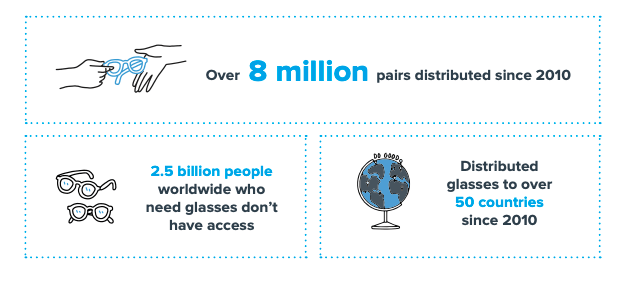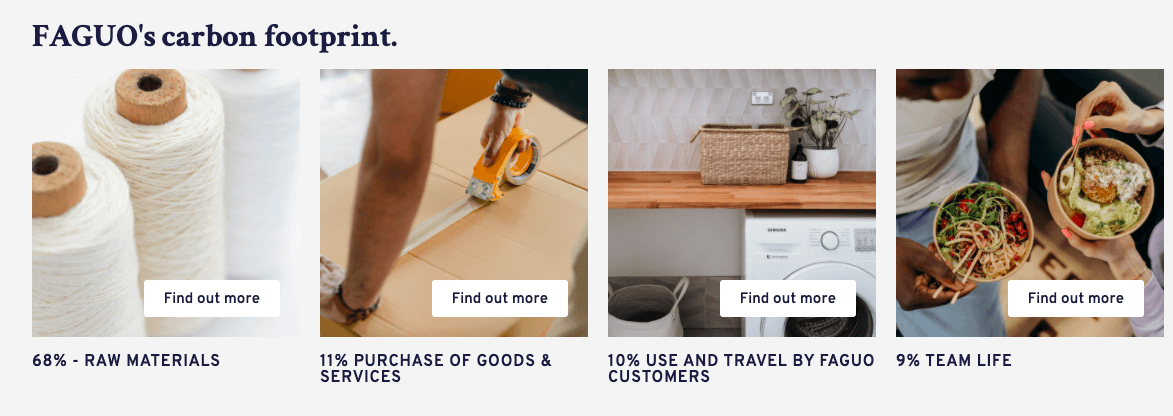
Last updated Tue May 20 2025
Ethical Marketing Done Right: 11 Examples of Brands Thinking Differently
Ethical marketing might seem like a contradictory concept at first. Yet, there are plenty of ethical marketing examples around.
Indeed, many bright minds have studied the relationship between “doing the right thing” and making profits, often with a little consensus reached.
But it’s the opinion of consumers that really matters here.
More and more customers are choosing businesses dedicated to helping environmental and social causes. Companies that apply ethics to their marketing as well are winning customer trust. And, importantly, those who only pretend to be ethical may lose that trust forever.
In this article, you’ll learn about 11 businesses doing ethical marketing the right way.
Go to content sections:
Boost conversions without the big price tag
Optimize your campaigns with CRO experiments, detailed analytics, A/B testing, and lead capture tools—all at a cost-effective price.
What is ethical marketing?
Ethical marketing is a philosophy and a strategy that seeks to promote honesty, trustworthiness, fairness, values, and responsibility in all marketing projects and actions. Ethical marketing includes marketing research, customer segmentation, and the management of all marketing campaigns.
Ethical (e.g. truthful) marketing is critical as 58% of consumers buy and advocate for businesses based on their values. That's why any company caught using exaggerated or manipulative claims in marketing campaigns would probably can out of business very quickly.
All ethical marketing examples are based on five important principles: empathy, honesty, sustainability, transparency, and promise-keeping.
The basic framework of ethical marketing
These essential ethics perspectives should inform businesses committed to ethical marketing:
Ethical marketing puts people above profits
Marketers are responsible for the outcome of the campaigns and advertisements they use
Marketers should embrace the essential ethical principles
Adoption of marketing ethics principles by the top management is crucial to creating ethical marketing campaigns
Businesses need to have a good understanding and implementation of ethical decision making when it comes to marketing
[Source: Laczniak, G. R., & Murphy, P. E. (2006). Normative Perspectives for Ethical and Socially Responsible Marketing.]
Ethical marketing examples
Here are the best examples of ethical marketing based on their commitment and success:
Allbirds — Fashion pollutes the planet
Patagonia — “Don’t buy this jacket”
Warby Parker — “Buy a pair, give a pair”
TOMS Shoes — “One Day Without Shoes”
Faguo — Engage a generation against global warming
Pela — The world’s first compostable phone case
Asphalte — Zero overproduction with pre-order model
Yes Straws — Alternative to plastic straws
Cusa — Inovative recycling program for customers
Everlane — “Radical transparency” in logistics
Illy Coffee — Reforestation, farmer education, sustainability
1. Allbirds
“Newsflash: Fashion pollutes the planet.”
Kind of intense, right?
Yet, it’s one of the marketing slogans that Allbirds is sticking with.
This brand is shaking up the clothing industry with its unwavering commitment to eco-friendly production. Allbirds measures everything that contributes to its carbon footprint and even publishes sustainability reports.
Allbirds highlight their environment-friendly practices in their marketing strategy. They have built awareness of their innovative supply chain, which involves renewable materials, green energy, and regenerative agriculture.
The brand even advertises the carbon footprint of each product. Wool Dasher Mizzle shoes, for example, generate 12.9 kg of CO2 that is later compensated.

Other notable recent marketing projects include:
Forest planting project with Berkeley School Forests
Collaboration with NFL star Marshawn Lynch to promote awareness of climate change in US schools
Advocating for sustainable agricultural practices by promoting The New Merino Company, an ethical wool company
The list goes on and on.
By using ethical marketing, Allbirds successfully sets itself apart from other businesses (and became one of the top Shopify stores). Now, it’s almost impossible to find any marketing content where Allbirds doesn’t mention something related to sustainability or social causes.
Needless to say, Allbirds is a certified B Corporation (a title given to businesses with the highest standards of verified social and environmental performance and public transparency). Another big accomplishment that consumers appreciate.


See the list: the top Shopify stores
2. Patagonia
Talk to any environmental activist, and they’ll tell you one thing: the fashion industry is one of the largest contributors to climate change. It generates 2.1 billion metric tons of greenhouse gas emissions annually—more than Germany, France, and the UK combined.
But businesses like Patagonia are changing the industry.
The brand’s philosophy is all about being green, so ethical marketing is a natural part of the strategy. Besides sharing awareness of environment-friendly practices, Patagonia also promotes anti-consumerism.
The “Don’t Buy This Jacket” campaign is a great example of ethical marketing.
Instead of encouraging consumers to buy more on Black Friday, Patagonia asked them to take a pledge to reduce consumption (see below). The campaign raised the awareness of the environmental impacts of consumerism in the industry and encouraged many to consider the effect of their purchases.

Patagonia’s ethical marketing strategy extends to all their content.
The company’s blog is a treasure trove of inspiring social activism stories, clothing repair tips, and video stories of people protecting the environment.
This amazing illustrated guide from the Patagonia blog teaches people to “donate with dignity” by outlining tips for donating clothes. It’s a part of the brand’s mission to protect the environment and encourage recycling of fashion.

But there’s one more huge aspect that makes Patagonia’s ethical marketing strategy brilliant: its own initiatives. With its “1% For The Planet” project, the brand has donated 1% of sales to the preservation and restoration of natural environments—over $140 million so far.
The bottom line here?
Thanks to the focus on ethical marketing, Patagonia is now a thought leader in social activism, environmental protection, and eco-friendly practices. Plus, it generates an impressive $19.8 million in annual revenue.
3. Warby Parker
Do you wear prescription eyeglasses? I bet you’ve lost them at least once.
The same happened on a backpacking trip to Dave Gilboa, one of Warby Parker’s founders. Being a student, he couldn’t afford to buy a new pair. Needless to say, that semester wasn’t quite the experience he wanted.
Fast forward a few years—
Gilboa’s business disrupted the eyeglasses market by drastically lowering prices. The success is phenomenal, as the founders (Gilboa is on left in the image) report a 38% annual revenue growth rate and two million active customers:

Gilboa’s frustration with the monopoly in the industry was the driving factor that set his company on a different course from its competitors.
Unlike other players, Warby Parker:
Has lower prices for prescription eyeglasses
Practices ethical marketing with charity programs
Started a foundation to donate glasses to those in need
The last two points make this business one of the best examples of ethical marketing. Warby Parker put its social philanthropy at the center of its marketing.
Let’s take the “Buy a Pair, Give a Pair” as an example of ethical marketing.
This program makes consumers agents of change. For each pair purchased, the brand donates one to charities through the Warby Parker Foundation. So far, over eight million glasses have been distributed in 50+ countries.

What makes Warby’s marketing strategy great is that every customer purchase makes a difference to the cause, and to the lives of the people it supports. That leads to emotional engagement, which is the strongest driver of loyalty.
For example, Warby Parker publishes an annual Impact Report to show how it is achieving its mission with the help of customers.
The report itself is a brilliant example of marketing that offers detailed info on everything from the company’s carbon footprint to the number of screenings and glasses distributed bits affiliated charity programs.
Here’s an extract offering an update on “Buy a Pair, Give a Pair.”
 To sum up the biggest takeaways from this ethical marketing strategy example: a) Make customers a part of your social programs, and b) Provide updates on your commitments with digestible and shareable reports.
To sum up the biggest takeaways from this ethical marketing strategy example: a) Make customers a part of your social programs, and b) Provide updates on your commitments with digestible and shareable reports.
Following this tip is a great way to create ethical marketing examples that will resonate with like-minded consumers.
4. TOMS Shoes
“All it takes is your barefoot photo.”
In the One Day Without Shoes campaign, the brand aimed to spread awareness of the lack of footwear available to children in developing countries.

"A shoe company asking people to go barefoot? I know it's odd, but we are so excited for people to once again join us in One Day Without Shoes. We ask people to go the day, part of the day, or even just a few minutes, barefoot, to experience what millions of children endure every day. Awareness and empathy are the catalysts of change."
Anyone could participate by posting a photo of their bare feet on Instagram with the hashtag #WithoutShoes. The reward was more than worth it: one photo equaled the donation of one pair of shoes to a child in need.

The results of the campaign were amazing.
As many as 296,243 photos were shared, making One Day Without Shoes one of the most successful ethical marketing examples from social media.
The culmination was this post from TOMS announcing the results.
 As far as ethical marketing is concerned, the One Day Without Shoes campaign was a big win for everyone.
As far as ethical marketing is concerned, the One Day Without Shoes campaign was a big win for everyone.
On the one hand—
The donated shoes will help, as the children often have to walk barefoot for miles to get food or clean water. Also, this basic necessity prevents podoconiosis, a debilitating disease that affects 4 million people globally (and is preventable by wearing shoes from an early age).
On the other hand—
TOMS was able to raise lots of brand awareness, improve customer relationships, and lower marketing costs. The campaign was even cited in academic marketing journals as an example of successful value co-creation campaigns on social media.
And it all began with this campaign announcement video:
Resources to engage more customers:
5. Faguo
When it comes to eco-friendly and ethical clothing companies, Faguo one is the example of a complete package.
Faguo maintains its eco-friendly standard by:
Offsetting its carbon footprint
Reducing harmful emissions from production
Planting a tree for every item sold (2+ million so far)
Promoting reasonable consumerism by repairing products
Collecting and recycling second-hand pieces from customers
Ethical marketing is at the heart of Faguo’s strategy. Their ethical marketing focuses on the ethical principles of sustainability, honesty, and transparency by investing in customer education, activism, and accountability.
First, customer education.
Faguo helps customers make more conscious choices about the fashion they buy. They use production processes that minimize the impact on the environment and then they educate their customers about these processes. And why they’re important.
Customers can click links on product pages to find out more. This one, for example, leads to the page where the brand’s manufacturing process is described:
 Next, activism.
Next, activism.
Faguo is involved in several initiatives. The brand promotes reduced consumerism, plants trees when purchases are made, and encourages recycling.
One example of ethical marketing we can pinpoint is The Make Friday Green Again project, whose goal is to spread awareness of the environmental impact of huge sales like Black Friday:
 And finally, accountability.
And finally, accountability.
Faguo takes its environmental responsibility seriously. The company has maintained a carbon footprint report (more info), which tracks the progress they’ve made towards achieving carbon neutral status.
Faguo isn’t in charge of measuring its own emissions, by the way. This is done by the Goodplanet Foundation, an independent authoritative body.
Customers also can learn how each aspect of Faguo’s operations contributes to the overall carbon footprint with website content like this:
 Everything Faguo does ties back to its mission: become a carbon neutral business that takes an active part in fighting climate change along with its customers.
Everything Faguo does ties back to its mission: become a carbon neutral business that takes an active part in fighting climate change along with its customers.

The website is Faguo’s main source of leads. Thanks to a great strategy, the brand gets 4,000 new leads monthly.
Learn more: Faguo Lead Generation Strategy.
6. Pela Case
The world’s first sustainable, 100% compostable phone case—
This is Pela Case’s original product developed to fight environmental pollution caused by the plastic-heavy smartphone case industry.

The brand is an example of using two ethical principles in advertising: promise keeping (a genuine intention to fulfill a goal) and integrity (being transparent with marketing).
The brand applies these ethics principles by:
Offsetting their entire carbon footprint
Sharing all data about manufacturing, materials, and footprint
Donating one percent of sales to environmental organizations
The brand also constantly reinforces its mission in marketing. Let’s see a couple of campaign examples.
“Plastic-Free July” was an example of an ethical marketing campaign that raised awareness of plastic pollution and ways everyone can reduce their footprint.
This post was a part of the effort:

The next great ethical marketing example—
A campaign where the brand’s Instagram followers could win an eco-getaway and other weekly prizes.
Here’s the announcement post with more details:

Like other great ethical marketing examples above, this campaign was a win for the brand, its cause, and the customers.
Pela Case demonstrated a commitment to environmental activism and promoted sustainable travel with this campaign. By staying true to the ethical principles of marketing, the brand also generated lots of awareness and engagement.
7. Asphalte
Asphalte is another brand that is changing the fashion industry.
Alongside the mission to eliminate overproduction, the company constantly promotes reasonable consumption.
But what really sets Asphalte apart is the pre-order business model. The brand only makes items that customers choose, so there’s no excess inventory or overproduction.
Choosing items is easy: just rate clothing from zero to 10 in a product survey. The whole thing takes a minute—a small commitment for setting fashion trends, agree?

To increase the longevity of products and reduce carbon footprint, Asphalte uses only quality, eco-friendly materials. Product care guides are also there to help reduce overconsumption.
The Winter Overshirt, for example, is made of 100% wool, so it needs specific care. Consumers can get tips from the care guide and make the item last longer.
 Overall, Asphalte serves as a solid example of ethical marketing in fashion. The brand’s marketing focuses on the pressing issues that plague the industry, helping to raise awareness of solutions and promote reasonable consumerism.
Overall, Asphalte serves as a solid example of ethical marketing in fashion. The brand’s marketing focuses on the pressing issues that plague the industry, helping to raise awareness of solutions and promote reasonable consumerism.

Allbirds, Faguo, and Asphalte have one thing in common: they are digitally native vertical brands (DNVBs).
Learn more: What is a DNVB?
8. Yes Straws
Guilt-free slurping.
That’s the promise of Yes Straws to their consumers.
The company is on a mission to reduce the number of plastic straws that could join the 8.3 billion already polluting the environment.
How?
With biodegradable straws made from 100% natural materials. Unlike its plastic cousin, it doesn’t contain any harmful chemicals and breaks down within weeks.
The family of products is made using wheat and cane stems:

Needless to say—
The brand’s marketing is centered around a unique value: protecting the environment by choosing a harmless alternative to plastic.
Here’s how Yes Straws achieves its goal to adhere to marketing ethics principles:
Has an almost zero-waste production
Uses innovative production methods, including an original technology to clean and sterilize wheat stems
Recycles waste from agricultural wheat harvesting
Another great thing about ethical marketing from Yes Straws is content.
The business produces articles that raise awareness of the dangers of plastic and the benefits of harmless alternatives. This way Yes Straws helps customers realize that every small thing matters when it comes to reducing their environmental burden:

Yes Straws is an example of eco-friendly brand using popups for lead generation.
Learn more about popups:
9. Cusa Tea & Coffee
Healthy beverages are incredibly common and popular these days.
That’s good but … there’s a problem.
Tea bags contain plastic (even one bag can release up to 11.6 billion microplastic particles into the cup!). Even paper ones are sealed with plastic glue (non-biodegradable polypropylene). Most of that plastic, unfortunately, ends up polluting the environment.
That’s where Cusa wants to make a difference.
Cusa’s marketing strategy promotes environmentally responsible choices in several ways:
Support of environmental projects
Use of eco-friendly packaging materials
Exchange of used tea and coffee sticks for coupons
Terracycle, the exchange program, is an interesting ethical marketing example. Cusa promises free shipping and a $5 coupon for those who send them used tea and coffee sticks. By doing so, the business reduces food waste and encourages eco-friendly choices.

To encourage more people to join the effort, Cusa also uses social media campaigns.
This one below, for example, challenges followers to guess how many tea pockets can fit in the so-called zero-waste box

The prize for the winner:
A free 30-serving pack of tea or coffee of their choice.
That’s a nice reward for a guess, agree?
Besides, the campaign is also a great example of ethical marketing. It shows the commitment to recycling and shares awareness of environmentally-friendly practices.
Combined with a long-term strategy of education and activism, Cusa is a good example of how business can market their products while staying true to admirable missions.
10. Everlane
“Radical transparency.”
That’s Everlane’s motto when it comes to … well, everything.
The business even shares costs behind their products—from materials to transportation. For example, here’s the breakdown of the price for denim products.
 Everlane is also committed to several important objectives.
Everlane is also committed to several important objectives.
As of December 2021, the company has completed 90% of its goal of eliminating all virgin plastic from the supply chain. Also, they’re pursuing several goals related to reducing emissions.

Another interesting element of Everlane’s ethical marketing strategy is sharing details about labor conditions.
The company's website has a special Factories section where we can find info about their locations, materials and techniques used, as well as images of employees at work.
These images, for example, come from a Hanoi-based facility:

Everlane really stands out on this list because of the willingness to disclose more information than others (especially production prices). It’s a huge step in the right direction, as far as ethical marketing is concerned.
11. Illy Coffee
Illy has been recognized for ten consecutive years as “a leader in advancing ethical business standards,” which applies to both operations and marketing.
The company is on the mission to change the coffee industry, which is known for exploitation of farmers, wasteful packaging, environmental destruction, and high carbon emissions.
To find out how Illy resolves these ethical issues, we can visit their “Road to becoming B Corp” website section.

There, we can see specific projects Illy implements.
For example—
To tackle the negative environmental impact, the company does reforestation, installs wastewater treatment facilities, and more.

Other notable projects include:
The “Escuela y Café” project: funding 64 rural schools in Colombia
The “Viveiro de Atitude” project: a nursery for 100 plant species
Buying wastewater treatment systems for 13 coffee producers in Nicaragua and Honduras
Overall, Illy has a lot of ethical marketing examples to share—and it’s a great example of how a company focuses on all critical issues its industry faces.
Ethical marketing examples: summary
Ethical marketing is important, and it benefits everyone.
The examples you've just read about show us that many companies are having huge success applying ethical principles to marketing. This strategy helps them appeal to like-minded customers and contribute to society in meaningful ways.
Also, the examples show us that ethical businesses share several things in common: they care about the environment, their customers, and local communities.
And, they help us learn how to make more conscious choices about the products we buy!

Oleksii Kovalenko
Oleksii Kovalenko is a digital marketing expert and a writer with a degree in international marketing. He has seven years of experience helping ecommerce store owners promote their businesses by writing detailed, in-depth guides.
Education:
Master's in International Marketing, Academy of Municipal Administration

